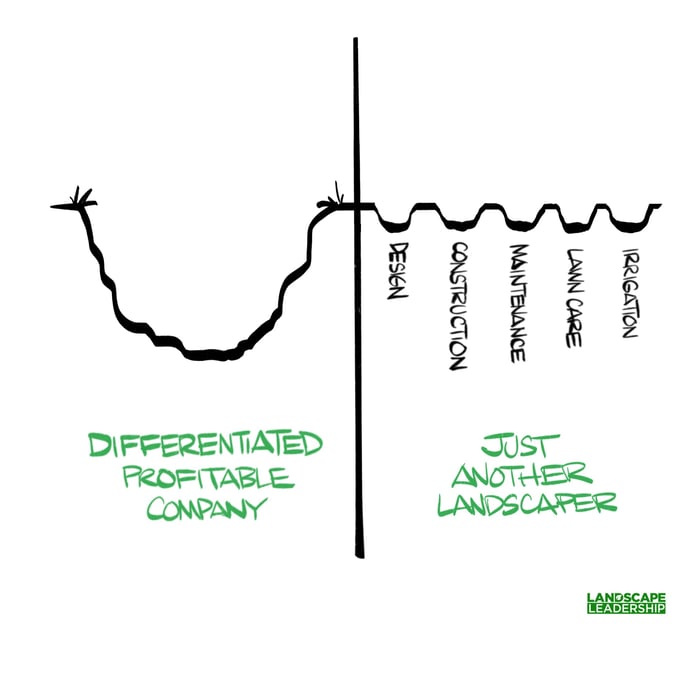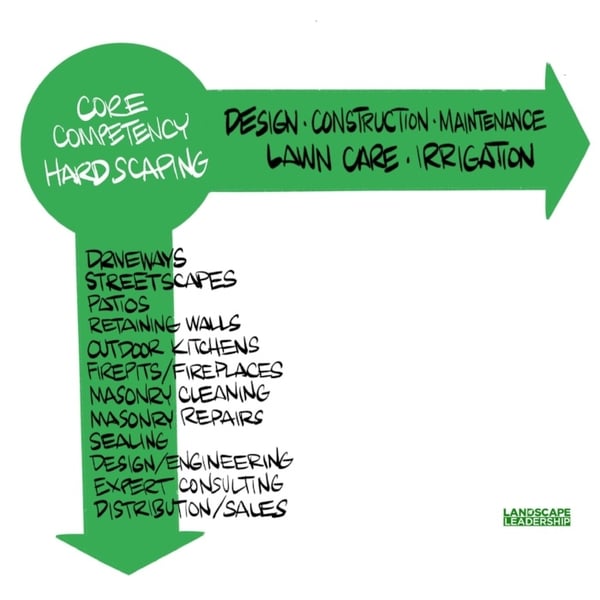Topics: Branding And Positioning Growth
The Right and Wrong Way to Diversify Your Landscaping Services
 Author: Chris Heiler
Author: Chris Heiler
In my last article, "Squashing the Full Service Myth", I called bull shit on this idea that your customers want a one-stop shop for all their outdoor needs.
I can summarize it like this:
If "full service" is your company's calling card then you are undifferentiated to the point you are easily replaceable by any competitor claiming the same.
"Full service" is not a strategy, my friends. I think of it more as a "happy accident" you've either intentionally or unintentionally grown into.
While offering every service under the sun may seem like an ideal way to grow top line revenue (spoiler: it's not), this approach to diversification will undoubtedly limit your profit potential.
Also, don't fool yourself into thinking "full service" is a buffer against an economic downturn. This is another myth perpetrated by countless expert-types in our industry.
Unfocused is still unfocused; in any economic climate. A prospering economy – like we're in now – hides the warts lurking under the surface waiting for the shit to hit the fan again.
When it does the first companies to fall to the wayside in a downturn will be those who are weakly positioned offering everything to everybody.
Okay, okay, enough of the doomsday...
"Depth" is your competitive advantage
In this light, let's talk about strategic diversification, which as you will see, stands in stark contrast to the typical full service model most lawn and landscape industry companies employ.
I'll refer to this as vertical diversification versus horizontal diversification. Let's define each:
Vertical Diversification: Developing a depth of service offerings around your core competency and positioning.
Horizontal Diversification: Offering a breadth of services so you can be everything to everybody.
Every company should have a core competency, whether that be a specialty (ex- masonry, carpentry), expertise (ex- permaculture, arboriculture), or industry/audience affiliation (ex- green industry, multi-family properties).
How you diversify your landscaping services should align with your core competency, not work against it by watering it down.
Think of diversification like digging a hole.
Differentiation is about deep versus wide. And the deeper you go, the harder it is for competitors to follow. They'll have to dig a long time to catch you, and chances are they're too busy digging lots of shallow holes.1

Depth is your competitive advantage, my friends.
My old landscape design firm, Fountainhead Gardens, was built around my deep expertise in period gardens and traditional architecture.
Here's how I diversified based on this core competency and positioning:
- Charged design and consulting fees that were significantly higher than my competitors.
- Acted as a general contractor on the construction of the landscaping projects.
- Designed and fabricated site furnishings and accessories for many of my projects (gates, arbors, trellis, furniture, etc.).
- Acted as a dealer/distributor for a number of upscale site furnishing manufacturers that allowed me to spec and sell their product like containers, statuary, fountains, architectural stone, etc.
This strategic approach helped me establish a valuable referral/collaboration network of architects and other designers and craftspeople which allowed me to compete against the more established companies in my market.
Let's look at another example using a hardscaping contractor with "masonry" as their core competency.
The sketch below illustrates the contrast in how this contractor could diversify their service offering.

Upon examination I think you would agree that most companies in the lawn and landscape industry diversify horizontally – digging many shallow holes – as opposed to going deep around their core competency.
If this contractor were to diversify vertically they would create a substantial competitive advantage for themselves which would look like this:
- Being positioned as the expert in their market will keep them in a leadership position ahead of their competitors.
- As the leader they will charge a premium price for their services which will lead to higher profit margins.
- With a unique identity they will be positioned to attract higher level job candidates when compared to competitors who all look the same.
- Laser focus around their core competency will lead to greater operational efficiencies (which will lead to increased profit margins).
- In an economic downturn it will be much easier to scale back operations compared to the bloated "full service" companies.
- Focus on their core competency will lead to more opportunity to collaborate with peers as opposed to competing head to head for scraps in their local market.
Wrap up
How would you like to have a competitive advantage like this?
The key is to diversify your service offering vertically with purpose as opposed to horizontally like most of your weakly positioned competitors.
Do you feel like you've been digging too many shallow holes, offering too many things to too many people? Do you look exactly like your competitors? Be honest in answering that last question.
We can help you regain your focus.
If you don't stand out in your marketplace and aren't making the profits you deserve then you need a purposeful Brand Positioning Strategy. Schedule a meeting today to learn more about how we can create this strategy with you.
Want more of our candid insight like this? Subscribe to our blog and join 4,000+ green industry professionals who receive our latest articles in their inboxes. Just add your email in the form below.
References:
1. Quote from Tim Williams, Positioning for Professionals, pg. 34




